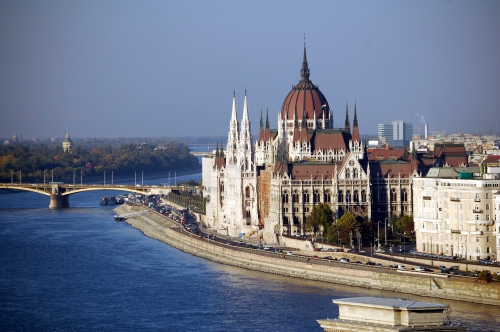
Hungría y las raíces de Europa
Historia de una revolución conservadora en el XXI
http://www.revistalarazonhistorica.com
Sergio Fernández Riquelme
Doctor en Historia y Política social. Profesor de la Universidad de Murcia (España).
Resumen: Hungría ha revolucionado, desde 2010, el debate político en el seno de la Unión europea sobre sus raíces históricas y sus perspectivas de desarrollo futuro. En un interesante contexto de transformaciones globales y de crisis económica persistente, la construcción europea se enfrenta al reto de definir y compartir los pilares morales y los valores comunitarios que deben dar sentido y significado a su propio proyecto, en este tiempo histórico, ante realidades ideológicas emergentes y frente a viejas identidades recuperadas. Y en el tiempo citado Viktor Orbán, primer ministro del país magiar, ha liderado una revolución conservadora de amplio calado sin parangón en el seno de la Europa unida, con una nueva Constitución como referente de partida, que la Historia de las ideas puede ayudar a descifrar.
Introducción.
El 18 de abril de 2011 el Parlamento húngaro sancionaba una nueva Constitución para Hungría; pero ésta no era una Carta magna más. Frente a una Europa occidental alejada de manera constante, cultural y jurídicamente, de sus referentes históricos tradicionales, el gobierno magiar proclamaba una Ley fundamental que no solo reconocía como fundamentales las raíces cristianas del país, sino que subrayaba una concepción del orden social, político y económico que protegía la identidad nacional del país ante los fenómenos transformadores que anunciaba la globalización.
La nación magiar había sido, hasta ahora, uno de los ejemplos postcomunistas de rápida y completa asimilación por Occidente. La fallida pero romántica revolución antisoviética de 1956 aun resonaba en la memoria cuando, tras la caída del muro de Berlín, Hungría fue uno primeros países de la órbita comunista en abrazar la democracia liberal y someterse a la tutela alemana.Pero entre 2007 y 2008, cuando una grave crisis económica puso de manifiesto la debilidades del monopolio demoliberal de estirpe norteamericana y de la misma construcción futura de la Unión europea, el contexto histórico pareció gestar, cuando no dar sentido y significancia, a una nueva y diversa corriente político-ideológica, en especial en los países periféricos más afectados por los recortes del Estado del bienestar y la intervención macroeconómica occidental (FMI y UE), o entre aquellos que, desde el refuerzo de su identidad nacional, buscaron ser alternativa al “fin de la Historia” de Fukuyama (un final basado en la homogeneización mundial del modelo useño) dentro de un mundo multipolar que el posible éxito del llamado “putinismo” podía demostrar viable.
En ese contexto parece explicarse, desde la Historia de las ideas, la génesis y el desarrollo de una no tan vieja “democracia soberana”, bien antiliberal bien comunitarista, fundada en la recuperación de identidades políticas y sociales bajo autoridades ejecutivas fuertes, la pretendida independencia económica, una dimensión nacional clara y una vinculación religiosa profunda, que parecían superadas en la globalización capitalista-liberal que abría el siglo XXI, y que en Europa Oriental parece haber germinado en diversas dinámicas estatales (Eslovaquia, Serbia, Ucrania, Macedonia, Rusia o Bulgaria) y en el Occidente del viejo continente con formas ideológicos y/o partidistas nacionalistas de nuevo cuño (del nacionalismo separatista de Escocia o Cataluña, al nacionalismo identitario de Francia, Alemania o Grecia).
Así en plena Unión europea, sin que sus propias instituciones y líderes lo pudiesen creer, uno de sus Estados miembros, liderado por el antiguo y aventajado discípulo liberal Viktor Orbán, no solo se declaró constitucionalmente como estado confesional cristiano (ecuménico), o asumió en esa misma Carta magna la Familia tradicional y el derecho a la vida. Y sobre todo, dichas autoridades comunitarias se frotaban los ojos tras las continuas victorias electorales de una opción política denunciada desde Bruselas como “autoritaria” y nacionalista, y que además proclamaba ya, sin ambages, la oportunidad histórica de un nuevo Estado nacional que podía superar los fallos del sistema liberal actual más allá del calculado euroescepticismo inglés. Y no solo eso, en su parlamento se había convertido en la tercera fuerza política la formación de nacionalismo identitario más importante de toda Europa: Jobbik, que parecía condicionar algunas de las principales líneas de actuación del mismo gobierno de Fidesz.
Solo el tiempo, clave vital de la Historia, contará del éxito o fracaso de esta nueva empresa político-social en pleno proceso de construcción europea, en el que Orbán pretende asumir la simbiosis entre el progreso socioeconómico y las raíces culturales tradicionales.

1. El inicio. La transformación personal y política de Viktor Orbán.
El 29 de mayo de 2010, Viktor Orbán asumió por segunda vez el poder como Primer ministro. Pero esta segunda vez todo sería diferente. Orbán encabezaba ahora una profunda transformación nacional que cuestionaba el omnímodo poder de Bruselas, y que parecía hacer irreconocible al antiguo político liberal y pro-americano que había deslumbrado en Bruselas.
Este jurista nacido en 1963 en Székesfehérvár, colaboró en la fundación en 1988 del partido político que le llevaría al mando del país. Nacía Fidesz (FIatal DEmokraták SZövetsége) o Unión cívica húngara. Desde esta plataforma inicialmente liberal, apoyó el proceso de caída de la vieja República socialista de Hungría, con su primer gran discurso, el 16 de junio de 1989, en la Plaza de los Héroes de Budapest (durante el entierro de Imre Nagy y otros mártires de la Revolución húngara de 1956). Su planteamiento democrático liberal se plasmó en tres ideas claves: apertura del país, elecciones libres y retirada de las tropas soviéticas. Su protagonismo le valió recibir una beca de la Fundación Soros ese año para formarse en el liberalismo político norteamericano; así, en el Pembroke College de la Universidad de Oxford), recibió el magisterio del profesor polaco Zbigniew Pelczynski, experto en transiciones postcomunistas.
En 1990 se convirtió en miembro del Parlamento húngaro y líder del Fidesz. Tras el derrumbe de espectro conservador electoral tradicional, abandonó el ideario liberal por el nuevo centroderecha en boga en Europa. Así refundó el partido como FIDESZ-MPP en 1995, formación con la que ganó las elecciones de 1998, en alianza con el MDF, llegando al 42% del voto escrutado. Poco después Viktor Orbán visitó Washington y en un almuerzo organizado por Freedom House, Mark Palmer, ex embajador en Hungría que conocía bien el invitado, lo presentó como el joven y prometedor líder de la Hungría democrática. Por ello, sus políticas de estabilidad y crecimiento liberales pusieron en boga a la nueva Hungría, convirtiéndose en miembro de la OTAN y candidato a la entrada en la UE (fue nombrado vicepresidente del Partido popular europeo en 2002) .
Pese a los éxitos económicos (reducción de la inflación más del 7% y crecimiento del 5% del PIB en el año 2000), la ruptura la coalición con la que gobernaba (en especial por la crisis del pequeño socio FKGP), y la campaña mediática de la oposición sobre su supuesto autoritarismo, le hizo perder las elecciones de 2002 ante la entente formada por el Partido Socialista Húngaro (MSZP) y la Alianza de los Demócratas Libres (SZDSZ).
En 2010, cuando menos lo esperaban, Orbán recuperó el poder, pero con un nuevo y claro programa. Tras ocho interminables años en la oposición, la destitución del gobierno socialista encabezado por Ferenc Gyurcsány por corrupción y mentiras le abrió de nuevo la puerta de entrada al poder. Así, en las elecciones de ese año FIDESZ consiguió el 52,73% de los votos y dos tercios de los escaños, los necesarios para transformar profundamente un país corrompido y endeudado.
 Y sorprendió ampliamente el espíritu conservador, nacionalista y cristiano de su nuevo proyecto conservador. Del anticlericalismo liberal de sus declaraciones y propuestas de 1991, a su afirmación pública en 2005 de “yo soy cristiano”. Una convicción manifestada en las palabras y en sus obras desde 2010. Junto a la acción legislativa en defensa de la identidad cristiana, sus discursos versaban sobre el papel de ésta en las raíces de Europa y en el futuro de Hungría, y en ellos abundaban las citas bíblicas y las frases religiosas latinas. Incluso Orbán anunció el lema de su gobierno: “soli Deo Gloria” .
Y sorprendió ampliamente el espíritu conservador, nacionalista y cristiano de su nuevo proyecto conservador. Del anticlericalismo liberal de sus declaraciones y propuestas de 1991, a su afirmación pública en 2005 de “yo soy cristiano”. Una convicción manifestada en las palabras y en sus obras desde 2010. Junto a la acción legislativa en defensa de la identidad cristiana, sus discursos versaban sobre el papel de ésta en las raíces de Europa y en el futuro de Hungría, y en ellos abundaban las citas bíblicas y las frases religiosas latinas. Incluso Orbán anunció el lema de su gobierno: “soli Deo Gloria” .
Una evolución personal ligada a la transformación político-cultural de Hungría liderada por Fidesz (y con el ascenso de Jobbik como claro exponente) con el apoyo de la alianza entre las dos confesiones “nacionales y establecidas” del país: la mayoritaria Iglesia Católica (con el cardenal Peter Erdö) y la minoritaria Iglesia reformada (con su pastor y mentor Zoltán Balog). Su colaboración se tradujo en la devolución de "la riqueza robada a las iglesias y al pueblo húngaro” por el comunismo, y la renovación de las Iglesias destruidas o envejecidas católicas y reformadas.
Este apoyo abrumador de la ciudadanía fue el punto de partida para legitimar su mandato en pro transformar el país desde una nueva revolución conservadora. El Parlamento desarrolló una enorme actividad legislativa: más de 800 iniciativas legislativas, desde la aprobación de una nueva Ley Fundamental (modificada cinco veces desde 2011), hasta una reforma electoral, pasando por la transformación de la justicia, la defensa de la minorías húngaras en los países vecinos.
 En primer lugar, la propia Carta magna impelía a reforzar la identidad nacional húngara, dentro y fuera del país. Se concedió la nacionalidad a los húngaros étnicos de los países vecinos, se financiaron escuelas en magiar en el extranjero, y se apoyaron partidos políticos propios en dichas regiones limítrofes. A ello se unía la recuperación del pasado nacional, marcado por la Constitución. En 2012 se comenzó a recupera la memoria de Miklós Horthy, regente y comisario del régimen húngaro desde 1920 hasta 1944, con nuevas estatuas y placas en Kereki, Debrecen o Gyömrő. En julio de 2014 un monumento en el Centro de Budapest para conmemorar el 70 aniversario de la ocupación nazi del país, que representa a Hungría como un arcángel, atacado por un águila, que sería Alemania , y el 20 de agosto, día de San Esteban y Fiesta nacional de Hungría, se recuperó el ceremonial de la Santa Misa dentro de la Basílica y que las Fuerzas de Defensa de Hungría participarán en la procesión del Santo Derecho.
En primer lugar, la propia Carta magna impelía a reforzar la identidad nacional húngara, dentro y fuera del país. Se concedió la nacionalidad a los húngaros étnicos de los países vecinos, se financiaron escuelas en magiar en el extranjero, y se apoyaron partidos políticos propios en dichas regiones limítrofes. A ello se unía la recuperación del pasado nacional, marcado por la Constitución. En 2012 se comenzó a recupera la memoria de Miklós Horthy, regente y comisario del régimen húngaro desde 1920 hasta 1944, con nuevas estatuas y placas en Kereki, Debrecen o Gyömrő. En julio de 2014 un monumento en el Centro de Budapest para conmemorar el 70 aniversario de la ocupación nazi del país, que representa a Hungría como un arcángel, atacado por un águila, que sería Alemania , y el 20 de agosto, día de San Esteban y Fiesta nacional de Hungría, se recuperó el ceremonial de la Santa Misa dentro de la Basílica y que las Fuerzas de Defensa de Hungría participarán en la procesión del Santo Derecho.
Y entre esas medidas, han pasado a la primera página de la prensa europea sus medidas en pro de crear un Estado democrático, soberano y centralizado, sobre los pilares de la Nación, la Familia y la Autoridad: proceso que ha sido definido por sus detractores como “una contrarreforma tradicionalista sin contemplaciones”, Pero sus datos económicos (el PIB creció un 1,3% desde 2013 y el desempleo cayó del de 10,4 a 8%) y la aceptación de sus propuestas se tradujeron en aplastantes victorias locales, nacionales y europeas en 2013 y 2014. Se había sancionado democráticamente la primera parte de su apuesta, de su revolución.
2. La consolidación. La nueva Constitución de Hungría.
La Constitución promulgada en 2011 recogía la esencia del proyecto de Orbán y FIDESZ. Así comenzaba con la proclamación “Dios bendiga a los húngaros”, y continuaba con una Confesión nacional que subrayaba las raíces cristianas de Europa y Hungría:
“NOSOTROS, LOS MIEMBROS DE LA NACIÓN DE HUNGRÍA, al inicio del nuevo milenio, con un sentido de responsabilidad de todos los húngaros, proclamamos por la presente lo siguiente: Estamos orgullosos de que nuestro rey San Esteban construyó el Estado húngaro en tierra firme y que hizo de nuestro país parte de la Europa cristiana desde hace mil años. Estamos orgullosos de nuestros antepasados que lucharon por la supervivencia, la libertad y la independencia de nuestro país. Estamos orgullosos de los excelentes logros intelectuales del pueblo húngaro. Estamos orgullosos de que nuestro pueblo ha defendido durante siglos a Europa en una serie de luchas y ha enriquecido los valores comunes de Europa con su talento y diligencia. Reconocemos el papel del cristianismo en la preservación de la nacionalidad”.

Una declaración que recordaba la continuidad histórica de la nación húngara jurídico-políticamente: “Honramos a los logros de nuestra constitución histórica y honramos la Santa Corona, que encarna la continuidad constitucional de la condición de Estado de Hungría y la unidad de la nación” . De esta manera rechazaba la ruptura jurídico-política tras la ocupación alemana y la ilegal Constitución comunista de 1949, momentos de “dominación tiránica” que la primera Asamblea Nacional, “libre, nacida de la Revolución de 1956” comenzó a desterrar al “marcar el camino de una recuperación de la libertad nacional, que el segundo día de mayo de 1990 proclamó definitivamente con la recuperación de la representación popular”. Así contenía que:
“Sostenemos que, después de las décadas del siglo XX que llevaron a un estado de decadencia moral, tenemos una necesidad permanente de renovación espiritual e intelectual. Confiamos en un futuro desarrollado de manera conjunta y en el compromiso con las generaciones más jóvenes. Creemos que nuestros hijos y nietos harán grande Hungría otra vez con su talento, persistencia y fuerza moral. Nuestra Ley Fundamental será la base de nuestro ordenamiento jurídico; será una alianza entre los húngaros del pasado, presente y futuro. Es un marco vivo que expresa la voluntad de la nación y la forma en la que queremos vivir”.
Sobre esta declaración de continuidad histórica se fundaba la defensa y promoción de la identidad nacional húngara:
“Nos comprometemos a preservar la unidad intelectual y espiritual de nuestra nación, desgarrada en las tormentas del siglo pasado. Proclamamos que las nacionalidades que viven con nosotros forman parte de la comunidad política húngara y son partes constitutivas del Estado. Nos comprometemos a promover y salvaguardar nuestro patrimonio, nuestro lenguaje húngaro único, la cultura, las lenguas y las culturas de las nacionalidades que viven en Hungría, junto con todo lo hecho por el hombre y los bienes naturales de la cuenca de los Cárpatos. Nosotros llevamos la responsabilidad de nuestros descendientes, Por lo tanto, vamos a proteger las condiciones de vida de las generaciones futuras, haciendo uso prudente de nuestros recursos materiales, intelectuales y naturales. Creemos que nuestra cultura nacional es una valiosa contribución a la diversidad de la unidad europea”.
Una Nación sostenida por un Estado fuerte y justo, protector de los más desfavorecidos y respetuoso de las comunidades naturales intermedias:
“Sostenemos que la familia y la nación constituyen el marco principal de nuestra convivencia, y que nuestros valores fundamentales de cohesión son la fidelidad, la fe y el amor. Sostenemos que tenemos un deber general para ayudar a los más vulnerables y los pobres. Sostenemos que el objetivo común de los ciudadanos y el Estado es lograr el más alto y posible nivel de bienestar, seguridad, orden, justicia y libertad. Sostenemos que la democracia sólo es posible cuando el Estado está al servicio de sus ciudadanos y administra sus asuntos de una manera equitativa, sin perjuicio o abuso”.

Posteriormente, en el articulado se concretaban algunos de los rasgos fundamentales de este proyecto:
· ElArtículo D recogía el derecho de Hungría de reconocer y proteger a sus compatriotas habitantes de regiones en países limítrofes (y que antes se encontraban dentro del Imperio austrohúngaro), señalando que “hay una sola nación húngara que pertenece al mismo grupo”, y “Hungría deberá asumir la responsabilidad por el destino de los húngaros que viven fuera de sus fronteras, y facilitará la supervivencia y el desarrollo de sus comunidades”.
· ElArtículo L protegía la concepción natural del matrimonio y la Familia, y la necesidad de una política de desarrollo demográfico, subrayando que “(1) Hungría protegerá la institución del matrimonio como la unión de un hombre y una mujer establecida por la decisión voluntaria, y la familia como base de la supervivencia de la nación. Los lazos familiares se basan en el matrimonio y / o la relación entre padres e hijos. (2) Hungría fomentará el compromiso de tener hijos”. A ello unía el Artículo II de la segunda parte que rezaba que“la dignidad humana es inviolable. Todo ser humano tiene derecho a la vida y a la dignidad humana; la vida del feto deberá ser protegida desde el momento de la concepción”.
· El Artículo M recogía la necesidad de una economía social de Mercado. Así “(1) La economía de Hungría se basa en el trabajo que crea valor, y sobre la libertad de empresa. (2) Hungría garantizará las condiciones de una competencia económica justa. Hungría actuará contra cualquier abuso de la posición dominante, y protegerá los derechos de los consumidores”.
3. El desarrollo. Hacia un nuevo Estado.
Había que cambiar el país de arriba abajo. Esa fue la pretensión del nuevo gobierno de Orbán, bajo tres premisas irrenunciables: continuar con el proceso de transformación recuperando la independencia de Hungría de la burocracia centralista (y pro-alemana) de la UE, reivindicar las raíces cristianas de Europa, y sancionar un nuevo Estado social y nacional alejado del falso liberalismo socialista.
3.1. La soberanía económica.
Sin libertad económica no había soberanía y Hungría no sería libre de realizar su proyecto de renovación nacional; y la Constitución sería, pues, papel mojado Así lo atisbó Orbán cuando llegó al poder en 2010. Dos años antes, el país caminaba hacia el abismo, siendo intervenido directamente por el FMI y la Comisión europea. El déficit era inasumible, el PIB caía brutalmente (-6,8% en 2009), la deuda crecía de manera imparable (hasta el 82%) y el Banco central anunciaba suspensión de pagos. El gobierno socialista-liberal, responsable de la crisis, entregó todo su poder a los dictados internacionales.
Frente a esta situación de dependencia, de “colonialismo” para Orbán, en primer lugar, el gobierno de Fidesz logró sacar al país de la recesión en 2103, reduciendo la inflación al 1,3%, creciendo el PIB de media un 1% entre 2010 y 2013. Y para asombro de todos, cuando la economía comunitaria se paralizó (crecimiento nulo en el segundo semestre de 2014), el PIB de Hungría creció un 3,9% (Oficina Central de Estadística de Hungría, KSH), la cifra más alta desde 2006.

Para culminar el proceso, en 2014 Hungría recuperó el control del Magyar Kereskedelmi Bank (MKB), comprando el 99% de las acciones al banco alemán Bayerisiche Landesbank . Y puso sus miras hacia el Oriente. Tras realizar importantes acuerdos comerciales con Kazajistán, Azerbaiyán y China (con la potencia asiática incluso compartiendo una estrategia militar conjunta), Orbán llegó a Moscú. El antiguo poder se convertía, ahora, en nuevo y prioritario socio, al que Occidente equiparaba ahora como modelos “putinistas”. El 31 de enero Orbán visitó por primera vez el Kremlin. En un ambiente cordial se firmaron acuerdos de colaboración económica (venta de gas y el proyecto South Stream). Putin declaró la importancia de la herencia ugrofinesa, raíz del pueblo húngaro, en la multinacional Federación rusa, y la importancia de las relaciones entre Rusia y el mundo centroeuropeo. Posteriormente, el primer ministro húngaro elogióla transcendencia de la cultura rusa y transmitió a Putin que era consciente de la actual importancia económica y política de Rusia, así como de la necesidad de sus inversiones (en la energía nuclear y en el sistema ferroviario): “Creemos que Rusia es una gran potencia. No sólo tiene un gran pasado, sino también un gran futuro. Así que es obvio que Hungría tiene un gran interés en el mantenimiento de una fructífera y estrecha cooperación con Rusia”. En dicha reunión se fraguó la firma en 2014 del acuerdo para que la compañía rusa Rosatom construyera dos nuevos reactores nucleares en Paks, valorado como “el contrato del siglo” por el portavoz del gobierno János Lázár al asegurar para el futuro la independencia energética de Hungría.
3.2. La Gran transformación.
La nueva Constitución marcaba el camino para la gran transformación conservadora de Hungría. En ella se contenía su esencia: el mandato de desarrollar gran parte de los artículos fundamentales en Leyes orgánicas posteriores, y las propias enmiendas que completaban las líneas maestras del proyecto. Así se aprobaron más de 360 leyes en solo cuatro años.
En primer lugar, el gobierno de Orbán apostó por la defensa de la Familia natural ante los problemas demográficos y morales heredados. Por ello, el 23 diciembre de 2011 el Parlamento húngaro aprobó la Ley CCXI de 2011 sobre la Protección de las Familias, centrada en proteger a los niños y sus familias ante la grave y actual crisis demográfica. La ley señalaba que "la familia es una comunidad autónoma establecida en la historia humana antes de la aparición de la ley y el Estado, que se apoya en razones morales”, siendo "el recurso nacional más importante de Hungría”. Con ello se reconocía a la misma “Como la unidad básica de la sociedad la familia es la garantía para la supervivencia de la nación y el medio ambiente natural del desarrollo de la personalidad humana, que debe ser respetado por el Estado". Esta ley toma medidas concretas para garantizar la protección efectiva de las familias, mediante la integración de la “perspectiva de la familia” en todos los ámbitos sociales y estatales. Una Ley revisada por la Comisión de Venecia (Comisión Europea para la Democracia por el Derecho) y apoyada por el memorándum del Centro Europeo para la Ley y la Justicia (ECLJ).

En segundo lugar se recortaron las competencias del Tribunal constitucional, el cual se había manifestado en contra de la Ley de protección a la Familia y de las primeras medidas del gobierno. De esta manera, el gobierno logró aprobar varias Enmiendas constitucionales. Una primera Enmienda recortaba los poderes del Tribunal Constitucional, que no podría pronunciarse ya sobre presupuestos ni impuestos realizados por el ejecutivo; y otra definía en la Constitución, explícitamente, a la Familia como fundada exclusivamente en el matrimonio.
En tercer lugar se aprobó una nueva ley electoral que creaba nuevos distritos electorales y permitía votar a 500.000 húngaros étnicos que vivían en países vecinos. A la que se añadió posteriormente la obligación de publicar propaganda electoral solo en medios públicos durante la campaña de elecciones. Y se sancionó en 2012 una Ley de prensa que establecía la obligación de realizar siempre una cobertura “equilibrada” a todas cadenas de radio y televisión y radio (no la prensa escrita).
En cuarto lugar, se desarrolló un Estado social justo y asistencial, siendo constante el compromiso del Gobierno con la solidaridad social como referente de la renovación nacional. En 2010 comenzó una estrategia de integración social del colectivo gitano (programas Komplex y Chance), especialmente para la inclusión social de los niños en pobreza extrema. En 2011 se lanzó el programa Erzsébet, una iniciativa del gobierno para ayudar en la integración de los niños de escasos recursos o con discapacidades. Desde 2013, el Plan de Acción de Protección de empleo dejaba exentos del pago de contribuciones y proporcionaba subsidios de cotización a las empresas que contratasen a madres que habían estado recibiendo prestaciones por maternidad o subsidio asistencial; y a partir de enero de 2014 - gracias al subsidio asistencial extra - los padres podían trabajar sin límites y al mismo tiempo recibir prestaciones de maternidad y prestaciones familiares por hijo.
Ese mismo año se diseñó un nuevo programa para ayudar a los más necesitados con el apoyo de la Unión Europea, bien familias con niños menores de tres años, bien los ciudadanos sin hogar y mayores con pensiones bajas, a los cuales se les proporcionarán paquetes de alimentos y asesoramiento gratuito para ayudarles a salir de la pobreza (tras consultas sociales con organizaciones y gobiernos locales, compartiendo sus opiniones e incluyendo sus recomendaciones), y se aplicó la reducción del precio de los libros de texto para las Familias. Además, la defensa de los trabajadores se tradujo en un aumento del 2,9 por ciento del salario bruto medio de los empleados a tiempo completo en términos interanuales . Una Política social nacional y responsable, que era para el Ministro de Estado de Asuntos Sociales y Familia Miklós Soltész, radicalmente diferente a la anterior, un modelo socialista organizado sobre organizaciones afines ideológicamente; por ello el ministro declaró que el gobierno no financiaría “a organizaciones no gubernamentales que abogaran por la falta de valores y cosas innecesarias”.
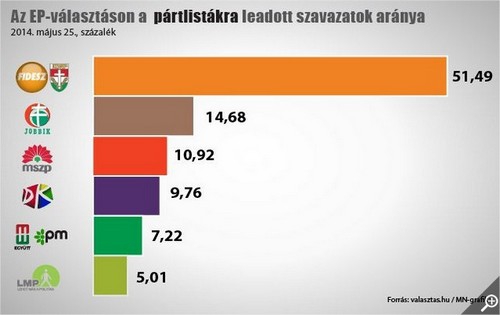
En quinto lugar desde 2012 el Gobierno lanzó, siguiendo el nuevo mandato constitucional, una campaña de sensibilización contra el aborto, considerado como una forma de violencia contra la mujer; en este sentido publicaron varios anuncios en los medios de comunicación bajo la imagen de un feto bajo el lema “déjame vivir y me doy en adopción”, financiada con fondos de la UE, y en 2013 esta campaña fue otorgada a la Fundación Ágota (Ágota Alapítvány) fundada por János Kothencz.
Pero aparte de reformar el campo institucional, había también que reconquistar el espacio cultural y educativo para difundir, social y mediáticamente, la identidad nacional y religiosa de Hungría. En el plano educativo, el gobierno comenzó a centralizar la educación pública, mediante un plan de renovación y control por un lado, y con la ayuda de convenios con las iglesias por otro. Desde 2010 los socios de la coalición con Fidesz, los Demócratas Cristianos (KDNP), se hicieron cargo de los asuntos educativos, culturales, sociales y de salud, y en colaboración con la conservadora Asociación Nacional de Padres de Hungría (Magyar Országos Szülők Szervezete) dirigida por Sándor Keszei, y la Asociación de Intelectuales cristianos (Keresztény Értelmiségiek Szervezete) representada por Julianna Gärtner y dirigida por el sacerdote Zoltán Osztie , lograron introducir en 2013 la educación religiosa, gradualmente como obligatoria, en las escuelas públicas; mientras, los hijos de padres no religiosos o de los padres que pertenecían a una denominación no reconocida por el Estado estaban obligados a tomar cursos de moral (erkölcstan), enseñada por los profesores formados en un curso de 60 horas realizado por los colegios confesionales. Además, desde 2011 se aseguró la financiación pública de los colegios religiosos, y se aprobó que los gobiernos locales pudieran entregar la gestión de las escuelas municipales a las iglesias, consiguiendo mayores incentivos económicos (subvenciones permanentes) y cierto control local de las mismas. El Ministro Soltész contraponía a los anteriores gobiernos socialistas que el gobierno de Fidesz había duplicado las instituciones educativas mantenidas por las Iglesias en Hungría, llegando a más de mil en 2014.
En la dimensión cultural se fomentaron las organizaciones y actividades de naturaleza religiosa y nacional. Imre Kerényi, representante personal del primer ministro encargado de los asuntos culturales, reivindicaba una cultura conservadora de raíces cristianas. Así proclamó, en un festival cristiano de teatro el 22 de mayo de 2014, que “el ochenta por ciento del arte europeo, y creo que el ochenta por ciento del teatro húngaro, es el producto de la cultura cristiana". Por ello "Europa es el triunfo del pensamiento cristiano, y también lo es Hungría. El problema en todo el mundo es que un "ismo" se ha hecho cargo de la alimentación principal en la educación de los directores y playreaders, que dice que no a todo esto... y esto ... establece un punto de vista donde la decadencia y la corrupción predominan” . Asimismo el nuevo director del Teatro Nacional de Hungría, Attila Vidnyánszky, declaró que “el teatro nacional era un espacio sagrado y por lo tanto habrá que consagrada por un sacerdote”.
Este proceso de transformación se encontró con las críticas de la misma UE. El presidente de la Comisión, Jose Manuel Durão Barroso, mandó una carta muy dura a Orbán para indicarle su seria preocupación ante la falta de compatibilidad de la transformación nacional con la propia legislación europea; mientras Viviane Reding y Guy Verhofstadt criticaron la amenaza que suponía Hungría para el Estado de derecho europeo, señalando la posibilidad de suspender los derechos del país considerado infractor y de su capacidad de voto en los organismos comunitarios (artículo 7 del Tratado de Lisboa).
Pero Orbán provocó, especialmente, las iras de Alemania, al rechazar su pretendida tutela como potencia hegemónica de la UE. Orbán pidió en una radio pública húngara que Alemania se abstuviera de intervenir en la política nacional húngara. Así declaró, que “los alemanes ya enviaron una vez la caballería, en forma de tanques; nuestro deseo es que no lo vuelvan a hacer, porque entonces ya fue una mala idea que no funcionó”. Estas declaraciones, que hacían referencia a la ocupación nazi de 1944, eran la respuesta del primer ministro húngaro a las palabras de Ángela Merkel sobre que Europa iba a hacer “lo posible por llevar a Hungría por el buen camino, pero no se trata de mandarles ahora la caballería”, y de Peer Steinbrück de revisar la posibilidad de “expulsar legalmente” a Hungría si ésta seguía por su senda antidemocrática.
Posteriormente, Orbán fue acusado de ser “el verso suelto de la UE”. El Parlamento europeo condenó el supuesto autoritarismo del gobierno de Orbán, planteando a su gobierno treinta medidas para asumir las normas comunitarias. Tras varios proceso de infracción abiertos por la Comisión, 370 diputados socialistas, liberales y verdes de la Eurocámara respaldaron el “Informe Tavares” sobre determinados abusos de poder , asumiendo Daniel Cohn Bendit el papel de juez ideológico en la sesión de condena. El informe citado denunciaba los enormes cambios legislativos en el país en algo más de un año, que chocaban de frente con los principios democráticos y progresistas de la UE, especialmente en los temas judicial y social, recomendando la creación de un sistema de control comunitario de las reformas de países como la misma Hungría. Frente a ellos, Orbán acusó a la UE de desplegar prácticas soviéticas contrarias a su libertad nacional, y apuntaba que:
“sé lo que significa ser un ciudadano de segunda clase. […] Estuve en contra del comunismo y no quiero volver a experimentarlo. No quiero una Europa donde se pone a los países bajo vigilancia, donde hay dobles varas de medir. Lucharemos contra eso”.
3.3. Las raíces de Europa.
En noviembre de 2011 Orbán pronunció su primer gran discurso en el extranjero. En la London School of Economics describió la victoria de Fidesz en 2010 como la máxima expresión de un deseo de los ciudadanos húngaros de un liderazgo fuerte capaz de cerrar la transición post-comunista, y la necesidad de una nueva Constitución que recuperara la identidad nacional del país centroeuropeo, que podía ser ejemplo para la construcción de la UE en los tiempos de crisis y globalización .

Años más tarde, en España realizó su discurso Una política basada en valores cristianos, base de la regeneración de Europa. En el palacio Euskalduna de Bilbao afirmó que la crisis que ponía en cuestión al proyecto de una Europa unida no era solo de naturaleza económica, sino especialmente moral. “Europa no funciona sin valores cristianos” espetó, como demuestra el ineficaz y centralista “pensamiento de liberalismo individualista que reina en la UE”. “¿Qué palabras evitan los tecnócratas de Bruselas?. Compromiso, honra, amor a la patria, constancia, grandeza, justicia…. Por ello una Europa cristiana no hubiera asumido la esclavitud del crédito”. Su nueva Constitución reconocía esa identidad cristiana esencial, recogiendo públicamente la opinión de los ciudadanos. “La mayoría de los húngaros no habían querido una Constitución cristiana, pero los convencimos”, ya que:
“miles de electores recibieron un cuestionario con 14 preguntas antes de que se redactara, pero no eran religiosas ni tenían un lenguaje cristiano. Por ejemplo, ¿un ciudadano tiene obligaciones o solo derechos?, ¿el ciudadano debe ser laborioso o vivir de subsidios? y cuestiones sobre la familia. Después, más de un millón de personas nos mandaron sus respuestas, y todos votaban a favor de los valores que consideramos cristianos. Así es como los principios cristianos pasaron a nuestra Constitución”.
En mayo de 2014 Orbán realizó, en su Conferencia en el Foro Europa de Berlín, una propuesta de debate sobre los desafíos del viejo Continente y cómo los países postcomunistas de la Europa Central pueden ser el referente del desarrollo de la Unión europea:
“El tiempo ha demostrado que la adhesión de los países de Europa Central a la Unión Europea ha resultado una historia compartida de éxito. Europa Central hoy no es una región periférica, no es una Europa a medias, sino una de las regiones de éxito y legítimamente apreciadas de Europa que contribuye al éxito europeo a través de su propio rendimiento. Creo que no está ya lejos el tiempo en que Europa Central realmente vaya a ser el núcleo de Europa y evolucione hasta llegar a ser el motor que conduzca el empuje del crecimiento europeo”.
Hungría podía marcar el camino“para poder aprovechar esta oportunidad histórica”. El país magiar hizo sus deberes tras el colapso del sistema comunista, convencido “de que la simple copia de las políticas occidentales iba a resolver todos los problemas. Parecía que lo único que teníamos que hacer para alcanzar nuestra meta, o sea, la libertad, así como el bienestar característico del mundo del oeste, era copiar las soluciones occidentales”. Y a principios de los años noventa parecía que lo mejor, y lo único, para la Europa central era copiar y adaptar el modelo económico y político occidental olvidando su identidad, “una historia de más de mil años en Europa”, especialmente tras el éxito de la reunificación alemana.
Todo había cambiado de repente. Estalló la crisis económica de 2008 y Hungría fue la primera nación que entró en colapso financiero. Ante esa situación “aprendimos que el sistema financiero y económico construido a base de copiar, no podía, en nuestro caso, soportar la carga” y que el papel de Europa en el mundo era cada vez menor. Por ello Hungría uso su “propia genialidad, nuestra propia fuerza y coraje, para encontrar nuestras propias respuestas a la crisis”. Así, en las elecciones del año 2010“se estableció un mandato que nos permitió sacar adelante nuestras propias soluciones y sacar a nuestra nación del atolladero económico con nuestras propias soluciones”; soluciones que habían demostrado que funcionaban, pero que no se limitaban a una mera reforma (como la adoptada por el conjunto de la UE como“ retórica popular”), sino una Renovación profunda que “significa una nueva constitución, un nuevo código civil, un nuevo código penal, una nueva legislación laboral, así como una nueva política económica”.
Era la hora de Hungría y Europa central. Ambas se habían transformado, con fuerza y confianza, fijando nuevas metas de desarrollo “más allá de la imitación”,aportando su experiencia e ideas en el debate sobre el “futuro de toda Europa”.El gobierno húngaro, por ejemplo, tenía que mucho que ofrecer al Oeste de Europa, no como vasallo, sino como colaborador desde “nuestra propia idea, cuyos resultados y desempeño van a contar al igual que otras ideas”.
En primer lugar había que“afrontar la realidad”. Una realidad europea “llena de preocupaciones”, donde las elites se encontraban paralizadas ante el crecimiento de las nuevas fuerzas políticas extremistas, los votantes se preocupaban por la falta de capacidad del liderazgo europeo; y ambos se enfrentaba a la pérdida de influencia de Europa en la economía y la política globales. Ante esta situación Orbán preguntaba: “¿dónde y por qué amenazan los terremotos políticos?”.
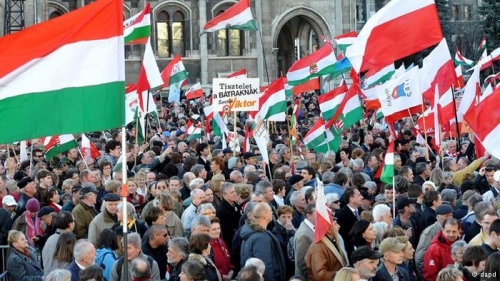
Los miedos descritos respondían a los retos que Europa debía afrontar, “temas delicados, por lo que abordarlos es políticamente arriesgado” y que “los asesores normalmente no suelen recomendar abordar estos temas”. Pero Orbán señalaba que no se podía responder a las amenazas reales y evitar el riesgo del terremoto en la UE “si no nos comprometemos con un discurso abierto”. Hungría, como comunidad política, aportaba desde el éxito de su recuperación y siempre bajo unos ideales claros y comprometidos, los temas del debate sobre el futuro de Europa:
a) La Soberanía económica. La primera y urgente cuestión que definía el futuro de la Unión Europea, ya que “aquí no podemos afrontar el vivir a cuenta del dinero de los otros” y “tarde o temprano tenemos que trabajar para ganar y devolver cada euro que gastemos”. Ante esta situación de dependencia, todos los Estados miembros debían hacer sus propios deberes y alcanzar su soberanía económica como Hungría, que “devolvió antes de su vencimiento el préstamo del FMI concedido para resolver su crisis financiera”, introduciendo en la Constitución un límite de endeudamiento público y reduciendo sistemáticamente la deuda nacional.
b) La recuperación demográfica. Una Europa envejecida, sin niños, solo sostenida momentáneamente por la emigración. Pero para Orbán “la inmigración masiva no es la solución al problema demográfico de Europa”, sino un sistema social y fiscal basado en la Familia natural y en su protección jurídica:
“La historia ha demostrado que las civilizaciones que no son biológicamente capaces de perpetuarse a sí mismas están destinadas a desaparecer y desaparecen. Nuestra civilización, Europa, hoy no es capaz de hacerlo. La inmigración masiva, que muchos propone como remedio, provoca tensiones que conducen a más conflictos y terremotos políticos, debido a las diferencias culturales, religiosas y de estilo de vida. El sentido común dicta que Europa en el futuro debe hacer frente a sus problemas demográficos por una vía natural, respetando y protegiendo la familia y la paternidad” .
c) La Identidad nacional.Hungría mostraba a Europa como el sentimiento nacional fortalecía a la comunidad, ya que “la mayoría de la gente en Europa sigue vinculada a su nación, especialmente en un sentido político”, La devoción por la patria da sentido a la pertenencia a la Unión europea como unión de naciones y no como entidad supranacional.
“Nadie puede eliminar la identidad nacional, ni borrar el sentimiento de orgullo y devoción nacional. Se trata de una necesidad natural del ser humano. El sentimiento nacional no debilita sino que fortalece una Europa compuesta de naciones”.
d) Las Raíces cristianas. Para Orbán “el cristianismo no es sólo una religión; es también una cultura sobre la cual hemos construido toda una civilización. No hay elección posible, se trata de un hecho”. Por eso era injustificable que “el insuficiente reconocimiento de las raíces, las tradiciones y el sentido cristiano de la vida en las instituciones de la UE, que alejaba sigue hiriendo al día de hoy a millones de europeos”. Los ciudadanos debía sentir que la política europea reconocía sus propias raíces, de no avergonzarse de “admitir que somos realmente un continente cristiano”, para no alejarse más respecto a la Unión Europea, que debía demostrar:
“en el futuro mayor respeto la cultura cristiana y por lo que necesitamos proporcionar mayor protección a las comunidades cristianas de fuera de Europa en el contexto de una política exterior y de seguridad europea común” .
e) La Familia natural. La tercera cuestión de su nueva sociedad abordaba el tema de “la Familia y las relaciones entre hombres y mujeres”, a su juicio “el tema más difícil” de defender en el mundo occidental. El futuro social de Europa pasaba por identificarse, como Hungría y otros muchos países “con el sentido cristiano de la familia”, respetando otras formas de convivencia pero afirmando “que en la Europa cristiana la familia es la unión de un hombre y una mujer”. Así afirmaba que:
“La gran mayoría de personas en Europa respeta la familia y se niega a reconocer – como yo mismo hago–, la relativización y la extensión de la noción de familia, a la que de esta forma se resta significado e incluso se la ridiculiza. Este es el motivo por el que hemos aprobado en Hungría una ley especial para la protección de las familias” .
f) El Trabajo. Éste era el último pilar de esa nueva sociedad para recuperar a Hungría y al viejo Continente de la crisis. “Europa sólo puede prevalecer y prosperar a través del trabajo”, proclamaba Orbán, mostrando su el papel del Estado en la concepción de “sociedad basada en el trabajo” desarrollada en Hungría, apoyando el empleo en vez de subvenciones, y restaurando la dignidad del trabajo manual. “Hungría y Europa serán fuertes si todo el mundo que puede y quiere trabajar tiene un puesto de trabajo”. Pero “como el sector privado no era capaz de dar a todos un puesto de trabajo, como es el caso actual en Europa”, debía implantarse el “workfare state” (“el Estado del trabajo”), intervención razonable del Estado en búsqueda del pleno empleo. Un Estado que respondía a la falta de competitividad de Europa ante las áreas americanas y asiáticas, con menor precio de la mano de obra, más flexibilidad laboral, mayor acceso a una financiación barata, la estabilidad regulatoria o el entorno propicio para el emprendimiento empresarial, y especialmente en un mejor precio de la energía.
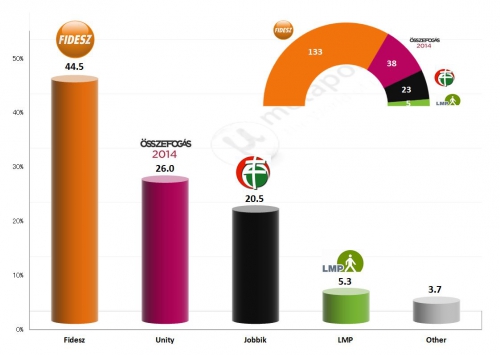
Orbán lo decía alto y claro. La experiencia húngara, basada en los principios expuestos y que identificaban a su gestión, era innovadora en una burocratizada y paralizada UE. Especialmente porque generaba un “nuevo discurso” en Europa, al demostrar éxitos económicos y políticos desde el centro político, y recibir “una mayoría de dos tercios en el parlamento húngaro”. Una experiencia basada en laestabilidad política, la independencia económica, el freno al extremismo y la importancia de los valores. Así concluía que:
“No estoy diciendo que lo apropiado para otros es seguir lo que Europa Central -y más específicamente Hungría- está haciendo. No osaría ir tan lejos; pero lo que sí afirmo es que merece la pena mirar lo que está pasando en Europa Central y Hungría y aceptar que tienen propuestas serias y dignas de debate para el futuro de Europa”.
4. El desenlace. Hacía el nuevo Estado no liberal.
Tras su abrumadora reelección en 2014 comenzó la siguiente fase del proceso, que apareció en las primeras planas de la prensa internacional. Llegaba la hora de un nuevo tipo de democracia en Europa, lejos de la que denunciaba como ineficiente y corrupta estructura liberal, y por encima de un subvencionado e insostenible socialismo del Bienestar; y en esa hora Hungría, para Orbán, sería la vanguardia europea de un fenómeno postliberal en germen en medio mundo.
La líneas maestras de su propuestas aparecieron dibujadas en su polémico discurso La era del Estado basado en el trabajo se está acercando, pronunciado enTusnádfürdő (Rumanía) el 29 de julio de 2014, en la vigésima quinta edición de la Universidad libre de Transilvania (Campus de Verano “Balvanyos”). Viktor Orbán esbozó en él las ideas del futuro Estado nacional húngaro frente a un auditorio de incondicionales: las minorías húngaras en Rumanía, que habían apoyado abrumadoramente al gobierno entre Fidesz y KNDP .
En primer lugar “la base del Estado húngaro recién organizado es una sociedad basada en el trabajo que no es liberal en su naturaleza, a partir de poderes políticos civiles cristianos y nacionales que rigen el país tras ganar las elecciones con dos tercios de los votos”. Esta victoria mayoritaria era la manifestación del "equilibrio moral" en el país frente aquellas fuerzas que habían votado en contra de la readmisión de los húngaros que viven más allá de las fronteras del país en diciembre de 2004; habían "recibido su justa recompensa" como resultado del hecho de que la alianza Fidesz-KNDP logró su espectacular resultado con la ayuda de los votos de los húngaros transfronterizos.
Una nueva era en Hungría emergía, construida tras lareestructuración de la economía mundial y el cambio en la potencia mundial que se hizo evidente en 2008. La generación que él encabezaba desde la recuperación de la democracia en 1898, debía ahora hacer frente a los “cambios que se producen en la actualidad” en “un mundo radicalmente diferente”. Y en este novedoso escenario histórico el Primer Ministro declaró que:
“hay una carrera mundial para inventar un Estado que sea más adecuado para lograr el éxito de la nación.Hoy en día, el mundo está tratando de entender los sistemas que no son no occidentales, liberales, tal vez ni siquiera las democracias, pero no obstante, son un éxito, y las estrellas de los analistas son Singapur, China, India, Rusia y Turquía”.
Por ello, “a pesar de la ruptura con los dogmas e ideologías que se han adoptado por parte de Occidente”, en Hungría “estamos tratando de encontrar la forma de organización de la comunidad, el nuevo Estado húngaro, que es capaz de hacer de nuestra comunidad competitiva en la gran carrera mundial en las próximas décadas”. Así, para edificar ese nuevo Estado el gobierno húngaro, alternativo al caduco modelo norteamericano para Tamás Fricz (investigador senior en su Instituto de Ciencias Políticas y profesor en la Universidad de Miskolc),se comprometió a “romper con los principios y métodos liberales de organización social”, ya que el anterior Estado liberal en manos socialistas no protegió a la comunidad nacional ante la crisis económica y moral sufrida, ignorando que “los húngaros que viven en todo el mundo son parte de Estado húngaro y no impidió que el país caiga en deuda o no protegió a las familias de la esclavitud de esa deuda". Este Estado del bienestar se había alejado de la “raíz de la nación-estado”, y debía ser sustituido por “el enfoque de un Estado basado en el trabajo”. Por ello proclamaba que:
“Los ciudadanos húngaros esperan que los líderes de Hungría desarrollen un nuevo tipo de organización estatal que, después de la era de la organización liberal del Estado, una vez más, hace que la comunidad húngara competitivo, respetando el cristianismo, la libertad y los derechos humanos”.
Esta reorganización del Estado húngaro, iniciada en 2010 y refrendada por la población en las urnas en 2014, era un imperativo histórico obligatorio. “La nación húngara no es simplemente un grupo de individuos, sino una comunidad que debe ser organizada, reforzada y construida” y en este sentido “el nuevo estado que se ha construido en Hungría no es un modelo liberal”, recogiendo los anhelos de la misma sociedad civil. Una sociedad orgullosa de su pasado, fraternalmente unida más allá de las fronteras actuales, enemiga de la “dictadura de la deuda” impuesta por los organismos liberales internacionales y de las injerencias de los países extranjeros occidentales. Así subrayaba la actuación del gobierno ante los intentos del activismo político liberal en el país, como por ejemplo la financiación de Noruega a organismos no gubernamentales apoyados por los partidos políticos de la oposición, o la adquisición pública del Banco MKB a los accionistas alemanes (con ello, la relación de la propiedad nacional de Hungría dentro del sistema bancario del país superaba el 50 por ciento).

Al final de su discurso, el primer ministro proclamaba que “aunque vivimos en un mundo en el que cualquier cosa puede suceder” y donde “hay razones para temer un futuro incierto”, el futuro mostraba que también tiene una gran cantidad de posibilidades y oportunidades para el desarrollo de la nación húngara:
"En lugar de miedo, aislamiento y retraimiento, recomiendo coraje, pensando en el futuro y la acción racional, siendo valientes para la comunidad húngara de la Cuenca de los Cárpatos, y de hecho para la comunidad húngara en todo el mundo. Dado que cualquier cosa puede suceder, que fácilmente podría ser el caso de que vendrá nuestro tiempo”.
Las críticas no tardaron, de nuevo, en llegar. La oposición lo comparó con el mismo Putin. La prensa liberal anglosajona denominaba la organización desarrollada por Orbán como “Estado iliberal” y a su propia figura como la de un nuevo Mussolini o un “mini-Putin” por ser el único gobernante de la UE en bloquear a Jean-Claude Junker como nuevo presidente de la Comisión, por apoyar económica y políticamente a Rusia en la crisis de Ucrania (considerando injustas y contraproducentes las sanciones), y desarrollar políticas internas consideradas como autoritarias .
Se concretaba la misión histórica de Orbán: una gran Hungría sobre un nuevo Estado construido desde el patriotismo económico (capitalismo de Estado), la democracia dirigida (posiblemente presidencialista) y las raíces cristianas (y sus valores sociales intrínsecos). Ante “los problema sistémicos” de la democracia liberal-capitalista y su Estado del Bienestar subvencionado, esta emergente organización político-social húngara sería un ejemplo de la alternativa histórica al liberalismo “cínico, neocolonial casi feudal” de los EEUU y sus vasallos en la UE; un modelo hegemónico agotado por la “corrupción, la ilegalidad, el sexo y las drogas” en su seno, y que había engañado por última vez al pueblo húngaro. Después de la Primera Guerra Mundial las potencias occidentales victoriosas, encabezadas por el presidente Woodrow Wilson, robaron a Hungría dos tercios de su territorio; tras la Segunda Guerra Mundial, en Yalta la nación fue vendida gratis a los comunistas; en plena revolución de 1956 Occidente no ayudó a los sublevados contra sus dominadores soviéticos; y desde la caída del comunismo, la UE y las organizaciones no gubernamentales occidentales (en especial la Fundación Soros) habían buscado tratado de restar al país su soberanía. Pero para Orbán se había acabado el tiempo de servidumbre y humillación para Hungría.
"Los húngaros son un pueblo de luchadores por la libertad" proclamó el primer ministro Viktor Orbán en el 25 aniversario del picnic paneuropeo en Sopron, una manifestación pacífica que condujo a la caída de la “Cortina de Hierro” en 1989.La transición poscomunista había aumentado el nivel de libertad ampliamente, pero en los últimos años se había resentido ante el crecimiento de la inflación, la corrupción, la deuda pública y el desempleo. Los éxitos de la transición política debían ser preservados, mientras que la evolución desfavorable tenía que ser cambiada, señalaba Orbán, especialmente ante una Europa occidental vulnerable económica y políticamente. "Hoy, el conjunto de Europa occidental está llamando para la renovación" concluyó.
Y en advenimiento de un tiempo histórico donde "Oriente" era alternativa soberana al mundo occidental, Hungría debía encontrar su propio camino, su modelo de desarrollo. Hungría no podía pedir prestado modelos económicos directamente a países como China, Rusia, Japón o Corea del Sur, debido a las diferencias culturales; al mismo tiempo, tampoco debía simplemente unirse "a un método europeo occidental que está perdiendo claramente sus reservas, y tal vez ya se les ha agotado". "Los húngaros tenemos una cultura fundamentalmente cristiana y estamos motivados por la libertad, por lo que debemos construir nuestro propio sistema con respecto a la economía y la política", dijo el primer ministro. Y para construir este camino, se inició en 2010 una revolución nacional gracias a la "victoria electoral de dos tercios" .

Sobre esta identidad y esta independencia proclamada, se tenía que sostener un desarrollo económico sostenible. En cuatro años Hungría se había embarcado en un período de crecimiento económico que podría colocar al país entre los de más rápido crecimiento de los estados miembros de la UE desde 2014. Por ello pedía a los embajadores defender la posición soberana y competitiva del nuevo "Estado basado en el trabajo". Frente a las políticas liberales de los Estados del bienestar, basadas en la mera subvención, Hungría debía profundizar en el papel productivo del Estado, generador de puestos de trabajo, protector del trabajador nacional, facilitador de la exportación, y defensor de buenas relaciones comerciales con Rusia ya que "la Unión Europea se está moviendo más lejos de Rusia todos los días, lo cual es malo no sólo para Hungría, sino para toda la UE". Esta experiencia histórica demostraba para Orbán que cada modelo político o económico estaba determinado (y debía estarlo para su propia supervivencia) por la cultura nacional, "por lo que en Europa no se puede seguir un modelo que no se base en el cristianismo". Apuntalando esta herencia, y frente a las exigencias globalizadoras y tecnológicas del mundo moderno, Hungría debía proseguir su camino, al calor de una batalla política contra las injerencias externas en pro de la construcción de su nuevo Estado, defendiendo su modelo propio en el debate sobre el devenir de la UE y su posición internacional independiente (ante las críticas por su rechazo a las sanciones comunitarias a Rusia en la crisis de Ucrania durante 2014).
Firmada en un acto ceremonial por el Presidente de Hungría, Pál Schmitt, en la Pascua del Lunes, 25 de abril de 2011. La nueva Ley Fundamental entró en vigor el 1 de enero de 2012.
Proceso histórico analizado en Sergio Fernández Riquelme, “Rusia como Imperio. Análisis histórico y doctrinal”. En La Razón histórica, nº 25, pp. 128-148.
Recuerda Antonio Moreno Ruíz que “pocos pueblos más sufridos hay en Europa que los húngaros. Tras la terrible Segunda Guerra Mundial, fueron entregados a la tiranía comunista teledirigida desde Moscú, bajo el régimen de la República Popular Húngara. Trágica paradoja, pues nada más impopular ha habido en su historia. En 1956, este valiente pueblo no dudó y se levantó contra esta terrible dictadura, abatiendo las estatuas de Stalin y desafiando a los poderosos tanques soviéticos, dando una portentosa y heroica lección de dignidad”. Antonio Moreno Ruiz, “Valiente pueblo húngaro”. La Razón histórica, nº25, 2014, págs. 17-21.
Se asimilaba el proceso húngaro a un supuesto modelo putinista alternativo a la democracia liberal, escenificado en toda su esencia desde la crisis de 2008, basado en el equilibrio entre tradición conservadora y modernidad económica, y que también se estaba dando en Turquía, China, Singapur o la India. Véase Alejandro Tapia, “La encrucijada húngara entre "democracia liberal" y "putinismo”. La Tercera, 02/08/2014.
Coretin Leotard, “El nacional-conservadurismo se afianza en la sociedad húngara: rechazo del FMI y austeridad, el cóctel explosivo del primer ministro Viktor Orbán”. Le Monde diplomatique en español, Nº. 222, 2014, págs. 6-7
El analista norteamericano Zakaria situaba este proyecto húngaro en la órbita del fenómeno del putinismo. Hungría “era un pionero de esta moda, convirtiéndose en el primer país europeo que denunciar y distanciarse de la democracia liberal. Se está adoptando un nuevo sistema y un conjunto de valores que son el mejor ejemplo de la Rusia de Vladimir Putin, pero están encontrando eco en otros países también”. Véase Fareed Zakaria, “The rise of Putinism”. The Washington Post, 31/07/2014.
María Dolores Ferrero Blanco, “La revolución húngara de 1956: el carácter político y la organización social”. Historia Actual Online, nº 10, 2006, págs. 99-113. Cfr. Hannah Arendt, “Reflexiones sobre la revolución húngara”. Debats, nº 60, 1997, págs. 118-141.
Charles Gati, “Putin's Mini-Me. The Mask Is Off”. The American interest, 07/08/2014.
Debreczeni József, Orbán Viktor. Osiris Kiadó, Budapest, 2002.
Szabó Kálmán: „Hiszünk a szeretet és az összefogás erejében”. Orbán Viktor politikai krédója. Kairosz Kiadó, Budapest, 2003.
Sebestyén István, “Orbán hite. Hogyan lesz tegia liberalis politikusból tradicionális szellemi vezető?”. Hetek, 02/02/2007.
Días antes de la formación del Gobierno de Orbán en junio de 2010 Gusztáv Bölcskei, obispo calvinista de Hungría, declaró que iglesias católica, reformada y luterana unirán sus fuerzas para "repensar la cuestión de las actividades educativas y sociales de las iglesias, además de sus finanzas y su compensación”.
Peter Bognar, “Rollercoaster ride from liberal to conservative”. The Budapest Times, 13/04/2014.
Un monumento denunciado por la oposición, al no condenar el régimen de Horthy durante la II Guerra mundial. Véase “Hungría dividida por un monumento sobre la ocupación nazi”. Euronews, 22/07/2015.
Jordi Vaquer, “Hungría iliberal”. El País, 07/04/2014.
Gáspár Miklós Tamás, “Hungría, laboratorio de una nueva derecha: Viktor Orbán, heraldo de la "pequeña burguesía virtuosa”. Le Monde diplomatique en español, Nº. 197, 2012 (Ejemplar dedicado a: Contrarreforma laboral), pág. 4.
Carlos Rodríguez Pérez, “Hungría: La constitución post Stalin”. Cambio 16, Nº. 2100, 2012, págs. 36-39
Para Hegedűs “euroescepticismo, control estatal de los medios y una nueva Constitución que mezcla un romántico nacionalismo con la retórica cristiana, son los pilares de la Hungría que Viktor Orbán construye a su medida”. István Hegedűs, “La fortaleza húngara”. El País, 29/06/2011.
Konrad ya advertía la prospectiva es esta transformación, aunque desde posiciones profundamente críticas. George Konrad, “Entre la democracia y la dictadura”. El País, 22/01/2013.
Ministerio de Economía Nacional, 14 de agosto 2014.
Ministerio de Economía Nacional, 24 de julio 2014.
Jerónimo Andreu, Ignacio Fariza, “La tentación totalitaria llega a Europa”. El País, 13/08/2014.
Hungarian Spectrum. 01/02/2013.
La sección 1 comenzaba así: “El Estado debe proteger las instituciones de la Familia y el matrimonio, en razón de su propia dignidad y valor”. Y la Sección 7 confirmaba a la Familia como “un sistema de relaciones (..) basada en el matrimonio entre un hombre y una mujer”. Véase http://eclj.org/PDF/eclj-memorandum-hungarian-law-on-the-protection-of-families.pdf
Human Rights Watch señaló que en vez de aceptar el fallo de la Corte Constitucional, "el gobierno introdujo cambios legales en marzo 2013 que agregaron las disposiciones de la Constitución y frenaron el poder de la Corte Constitucional para revisar los cambios a la misma” (16 de mayo de 2013) y el Parlamento húngaro "elevó la definición excluyente de familia a nivel constitucional" (18 junio de 2013). Véase Hungarian Spectrum, 2013.
Ministerio de Economía Nacional, 18 de julio 2014.
“Fe y organizaciones benéficas ayudan a la curación”. Gobierno de Hungría, 29 de julio 2014.
Magyarnarancs, 20/02/2013. En 2013 se otorgó la Orden del Mérito de Hungría, durante la celebración de la revolución de 1848-184, a János Kothencz, director general para los niños y problemas de la juventud de la diócesis católica de Szeged-Csanád y creador de la Fundación Ágota, junto a personalidades conservadoras como Tamás Fricz, el organizador de la "Marcha por la Paz" y su ONG, el Foro de la Unidad Civil (Civil Összefogás Fórum, COF) o Emőke Bagdy, psicólogo que estableció la Sociedad para la Investigación de la Familia.
El Secretario de Estado, el demócrata cristiano Miklós Soltész anunció que los padres adoptivos están obligados a tomar un curso de 400 lecciones desarrolladas por el Colegio Católico Apor Vilmos, dirigido por Mária Fülöpné Erdő, y financiado por los fondos de la UE. El curso sería obligatorio también para los padres de crianza temporal a tiempo parcial (que pasarán 52 días de fin de semana menos con sus hijos de crianza) o para las personas que se comprometieron a criar a los niños de su familia o amigos muertos. Los padres que no completaron el curso antes de 2017 perderían la custodia o tutela de los hijos. Nepszava, 20/10/2013.
Osztie recibió la Cruz de la Orden del Mérito de la República de Hungría el 20 de agosto de 2011.
Más y más personas dependen de Iglesias para la educación.Ministerio de Educación, Gobierno de Hungría, 23 de julio 2014 16:51
Y ante esa situación era fundamental “que haya un cambio en la Universidad de Teatro, Cine y Arte, […] y si yo fuera virrey quitaría los derechos de educación de los actores de la Universidad de Teatro y Cine con menos dinero”. Para Kerényi los actuales playreaders, eran como “Mr Nobodys”; unos niños dramaturgos con sus medias de color azul en una pierna y verde en sus otros pies, todos ellos son un poco de arco iris de colores, muy nueva ola”, llegando a la conclusión de que los consejeros y los actores deben ser “liberados de la hipnosis de playreaders y críticos”. The Budapest Times, 13/06/2014.
Soledad Gallego-Díaz, “Las graves noticias que llegan del Este”. El País, 24/03/2013.
Inmediatamente los medios germanos atacaron a Orbán. La televisión pública alemana (ZDF) emitió un video llamado "Tarjeta Roja para Hungría", donde se insistía que Hungría estaba rompiendo las reglas de la UE, al ser controlados los medios de comunicación por el gobierno y recortar las funciones de control del Tribunal constitucional, pidiendo continuamente que Hungría fuera expulsada o recortada en su financiación. Y el canal austriaco 4plus ofreció otro programa en el que definía a Orbán como un minidictador
Juan Gómez, “El primer ministro Orbán dijo que Berlín ya envió sus tanques a Budapest en la II Guerra Mundial”. El País, 21/05/2013.
En 2013 el presidente Barroso mandó al gobierno húngaro una carta que recordaba los dos puntos conflictivos de los cambios constitucionales realizados ese mismo año: 1) la autorización de tasas especiales que pagarán los ciudadanos siempre que la nación húngara sea multada por el Tribunal Europeo de Justicia; 2) la competencia exclusiva de la Oficina Nacional Judicial a la hora de transferir los casos entre juzgados; y 3) la citada reforma electoral.
James Kirchick, “The Orban Effect: EU Conservatives Have a Hungary Problem”. Spiegel online, 29/05/2013.
Lucía Abellán, “La Eurocámara reprueba el autoritarismo del primer ministro húngaro”. El País, 3/07/2013.
“United front against Viktor Orban, the Catholic conservative”. Vatican Insider, 03/13/2012.
Silvia Blanco, “El primer ministro húngaro difunde en España sus polémicos mensajes”. El País, 16/04/2013.
Viktor Orbán, “Las raices cristianas de Europa. Discurso en Berlín”. La Razón histórica, nº 26, 2014.
Silvia Blanco, “Un enérgico cruzado del populismo. Orbán, que luchó contra el comunismo en Hungría hace 25 años, acapara el poder en todos los ámbitos con un mensaje nacionalista, conservador y cristiano”. El País, 6/04/2014.
Discurso completo en la página del Gobierno húngaro: http://www.kormany.hu/en
Igor Janke, Hajrá magyarok! – Az Orbán Viktor-sztori egy lengyel újságíró szemével. Rézbong Kiadó, Budapest, 2013.
Viktor Orbán, “The era of the work-based state is approaching”. Kormany, 20/07/2014.
Free Hungary, 27/07/2014.
“Viktor Orban’s illiberal world”. Financial Times, 30/07/2014
Damien Sharkov, “Hungary’s Mussolini' Vows to Make the EU Member an 'Illiberal State'”. Newsweek, 30/07/2014.
Para Gati, que conoció a Orbán y alabó su primera postura liberal, “Orbán ha dejado caer su máscara democrática. Su discurso confirma lo que sus críticos nacionales y extranjeros han dicho durante años sobre su democracia dirigida y lo que hasta ahora sus propagandistas y fieles seguidores han negado acaloradamente. Porque él ha ahora públicamente, y con orgullo, declaró su preferencia por un estado no liberal, rompiendo con dogmas e ideologías reconocidos en Europa occidental". Charles Gati, op.cit.
Matt Chorley, “Cameron's ally in EU jobs battle Viktor Orban announces he wants to 'build an illiberal new state' in Hungary”. Daily mail, 30/07/2014.
Viktor Orban, "Los húngaros son luchadores por la libertad". Kormany, 22/08/2014.
Viktor Orbán, "Reunión anual de Embajadores de Hungría". Kormany, 26/08/2014.
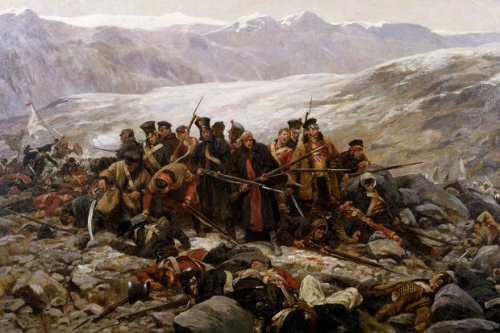







 del.icio.us
del.icio.us
 Digg
Digg

 George Feltin-Tracol est l'un de ceux-là. Il nous propose régulièrement des analyses pertinentes sur notre monde, passe au peigne fin, si l'on ose dire, la question du contrôle de la société par les puissances étatiques, financières, médiatiques, dont l'objectif est d'instaurer un État mondial de tonalité totalitaire. Son ouvrage, En Liberté surveillée, remarquablement documenté, se veut, en même temps, une chronique des prémisses d'une « mise au pas » de la société française par un régime qui n'a plus aucune espèce d'inhibition « démocratique ». Les résistances multiformes, que tout le monde a en mémoire, et qui témoignent de la richesse plurielle (terme adéquat, cette fois!) de la lutte populaire, par exemple les manifestations contre les spectacles blasphématoires « Piss Christ », « Golgota picnic », l'affaire de Tarnac, le « cas » Dieudonné, la « Manif pour tous », ont pour réponses les emprisonnements politiques, la censure, la brutale répression policière, les manipulations. La sphère politique est empoisonnée par l'idéologie nihiliste, les « nouvelles sacralités », qui suscitent des « phobies », lesquelles arment le bras de la « Justice », sans compter la vidéo-survillance, qui contrôle les routes et les rues, la novlangue, qui formate les consciences, l'endoctrinement scolaire, le néo-puritanisme, expression extrême de la clitocratie triomphante, dont l’égérie est la Suède, matrice du totalitarisme postmoderne dévirilisant, infantilisant, Grande Nursery dont Big Mother est la maquerelle fouettarde. Ces liens tressés par des Lilliputiens doctrinaires, liens dont le plus puissant, en ce moment, est incarné par le communautarisme, pendant symétrique d'un individualisme consumériste, sont destinés à étouffer notre identité... Ainsi cette entreprise liberticide évoque-t-elle la mise en place d'un despotisme nouveau, plus complexe, plus subtil, plus savant que les anciennes tyrannies, qui n'étaient que des ateliers artisanaux à côté de lui.
George Feltin-Tracol est l'un de ceux-là. Il nous propose régulièrement des analyses pertinentes sur notre monde, passe au peigne fin, si l'on ose dire, la question du contrôle de la société par les puissances étatiques, financières, médiatiques, dont l'objectif est d'instaurer un État mondial de tonalité totalitaire. Son ouvrage, En Liberté surveillée, remarquablement documenté, se veut, en même temps, une chronique des prémisses d'une « mise au pas » de la société française par un régime qui n'a plus aucune espèce d'inhibition « démocratique ». Les résistances multiformes, que tout le monde a en mémoire, et qui témoignent de la richesse plurielle (terme adéquat, cette fois!) de la lutte populaire, par exemple les manifestations contre les spectacles blasphématoires « Piss Christ », « Golgota picnic », l'affaire de Tarnac, le « cas » Dieudonné, la « Manif pour tous », ont pour réponses les emprisonnements politiques, la censure, la brutale répression policière, les manipulations. La sphère politique est empoisonnée par l'idéologie nihiliste, les « nouvelles sacralités », qui suscitent des « phobies », lesquelles arment le bras de la « Justice », sans compter la vidéo-survillance, qui contrôle les routes et les rues, la novlangue, qui formate les consciences, l'endoctrinement scolaire, le néo-puritanisme, expression extrême de la clitocratie triomphante, dont l’égérie est la Suède, matrice du totalitarisme postmoderne dévirilisant, infantilisant, Grande Nursery dont Big Mother est la maquerelle fouettarde. Ces liens tressés par des Lilliputiens doctrinaires, liens dont le plus puissant, en ce moment, est incarné par le communautarisme, pendant symétrique d'un individualisme consumériste, sont destinés à étouffer notre identité... Ainsi cette entreprise liberticide évoque-t-elle la mise en place d'un despotisme nouveau, plus complexe, plus subtil, plus savant que les anciennes tyrannies, qui n'étaient que des ateliers artisanaux à côté de lui.

 Y sorprendió ampliamente el espíritu conservador, nacionalista y cristiano de su nuevo proyecto conservador. Del anticlericalismo liberal de sus declaraciones y propuestas de 1991, a su afirmación pública en 2005 de “yo soy cristiano”. Una convicción manifestada en las palabras y en sus obras desde 2010. Junto a la acción legislativa en defensa de la identidad cristiana, sus discursos versaban sobre el papel de ésta en las raíces de Europa y en el futuro de Hungría, y
Y sorprendió ampliamente el espíritu conservador, nacionalista y cristiano de su nuevo proyecto conservador. Del anticlericalismo liberal de sus declaraciones y propuestas de 1991, a su afirmación pública en 2005 de “yo soy cristiano”. Una convicción manifestada en las palabras y en sus obras desde 2010. Junto a la acción legislativa en defensa de la identidad cristiana, sus discursos versaban sobre el papel de ésta en las raíces de Europa y en el futuro de Hungría, y  En primer lugar, la propia Carta magna impelía a reforzar la identidad nacional húngara, dentro y fuera del país. Se concedió la nacionalidad a los húngaros étnicos de los países vecinos, se financiaron escuelas en magiar en el extranjero, y se apoyaron partidos políticos propios en dichas regiones limítrofes. A ello se unía la recuperación del pasado nacional, marcado por la Constitución. En 2012 se comenzó a recupera la memoria de
En primer lugar, la propia Carta magna impelía a reforzar la identidad nacional húngara, dentro y fuera del país. Se concedió la nacionalidad a los húngaros étnicos de los países vecinos, se financiaron escuelas en magiar en el extranjero, y se apoyaron partidos políticos propios en dichas regiones limítrofes. A ello se unía la recuperación del pasado nacional, marcado por la Constitución. En 2012 se comenzó a recupera la memoria de






















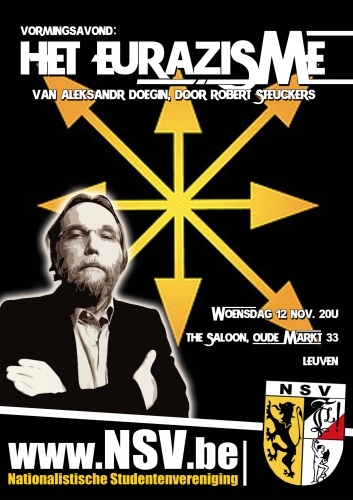




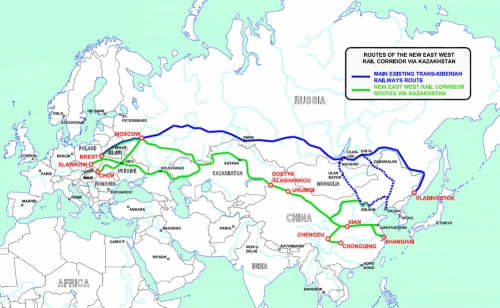




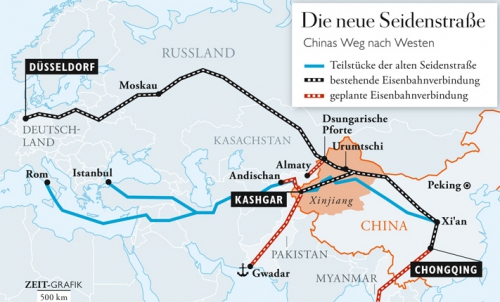
 Le Monde du 17 octobre publiait une pétition, signée par d'éminents universitaires, dont le titre - « Marcel Gauchet, (en médaillon - NDLR) victime d'une hargne aveugle » - ne laissait aucun doute sur ce qu'est la Police de la pensée contemporaine, inquisitoriale, expédiant au bûcher quiconque réfléchit, souvent enfermée dans des catégories idéologiques ineptes, et animée d'une acrimonie indigne d'un véritable esprit de recherche. « La stigmatisation haineuse est la marque du désespoir » souligne pertinemment le texte.
Le Monde du 17 octobre publiait une pétition, signée par d'éminents universitaires, dont le titre - « Marcel Gauchet, (en médaillon - NDLR) victime d'une hargne aveugle » - ne laissait aucun doute sur ce qu'est la Police de la pensée contemporaine, inquisitoriale, expédiant au bûcher quiconque réfléchit, souvent enfermée dans des catégories idéologiques ineptes, et animée d'une acrimonie indigne d'un véritable esprit de recherche. « La stigmatisation haineuse est la marque du désespoir » souligne pertinemment le texte.

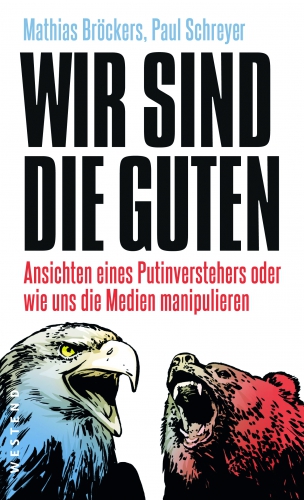 Deutsche Wirtschafts Nachrichten:
Deutsche Wirtschafts Nachrichten: 


